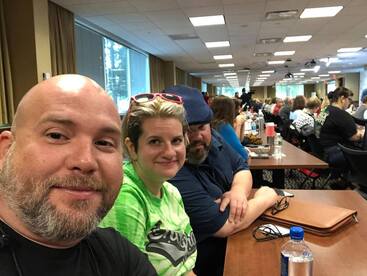 It's time for the third and final installment in my series on some of the common obstacles I face in my writing. Today, I'll attempt to tackle the problem of ghosts - what are they and why do they stop us from writing? What is a Writing Ghost? For me, at least in my writing, a ghost is the specter of my own past success, and just like a "real" ghost, it can come back to haunt my future projects. In truth, it's really just another version of impostor syndrome. If you're unfamiliar with impostor syndrome, you can read about it here. There's also a great story about Neil Gaiman dealing with his own bout of impostor syndrome here. In writing, my personal ghost stems from the ironclad belief that any past success I've enjoyed was achieved almost completely by accident. It's the old anecdote that if a million monkeys sat at a million typewriters working for all of eternity, one of them would eventually write MacBeth. In my mind, I am that monkey (not to compare any of my novels to MacBeth, but you get the idea). I think my success is purely a result of dumb luck. Somehow, by some miracle, I've caught lightning in a bottle, and any hope of repeating that past results is akin to winning the lottery... twice. This particular ghost likes to manifest itself early in any new project. You write a chapter or two, look them over, and are quickly convinced of how terrible your writing truly is. The immediate impulse is to abandon the current novel, wallow in your abject failure, and reconsider even starting any and all future writing projects. How Quickly We Forget. So how do we "bust" our writing ghosts? For me, the best solution came when a friend asked me to give a talk at her school. She asked me if I could share previous drafts of my novel so that her students could see the editing/revision process. Fortunately, I save everything. I quickly dug up my first draft of Kira the Rainbow Princess, and much to my surprise... it was absolutely terrible. I was stunned. How could my novel - my pride and joy - been born from something so incredibly, objectively bad? So often we forget how terrible those early drafts of a novel or story can be, and when we forget that simple fact, we also ignore the truth that half of the skill of writing is found in fixing our own mistakes. Great writers are great because they're flat-out better at finding and correcting their own mistakes. They can hear when a line of dialogue rings false. They see a plot device meandering off into a dead end from a mile away. They have an innate (and ruthless) instinct for when characters, subplots, and chapters - yes, entire chapters - must be brutally wiped from existence. Once is Luck, Twice is Skill. As writers, we must acknowledge the skill of revision. We must give ourselves credit for fixing our own mistakes. And we must finish our novels. There are lessons that can only be learned from finishing a novel - lessons we miss when we start and abandon a project before ever attempting a second draft. At the Rutgers Writers' Conference, Neil Gaiman told the story of a writer who found him one afternoon and asked his advice. She recounted all the steps she had taken to secure an agent and publish her first novel. Nothing had worked. She asked him what she should do next... "Start writing your next book," Neil Gaiman answered. And in those words, is advice for all of us. Writing is a skill. Finishing a novel is a skill. Revision is a skill, and just like every other skill in the world, they all improve with practice. There exists a million reasons NOT to write - including Writer's Block, Guilt, and Ghosts - but more than anything, writing is what we need to do. In the words of Samuel Beckett, "Ever Tried. Ever Failed. No Matter. Try Again. Fail Again. Fail Better." #WriteOn 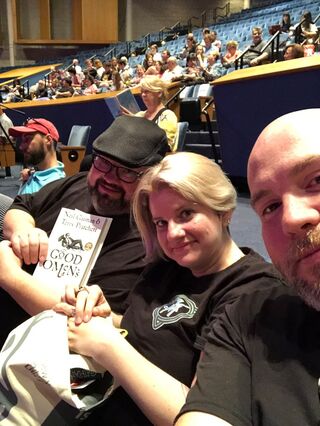 Last week, I began a series talking about some of the challenges I face in my writing. We started by tackling the hobgoblin of writer's block, and exposed it for what it truly is, a clever excuse NOT to write. Today we continue the series with a look at something far more dangerous to creativity . . . GUILT. "Every man is guilty of all the good he did not do." - Voltaire. In a nutshell, guilt is the emotion we feel when we act (or fail to act) in accordance with what we know to be right. I would say more, but it is a universal experience. It is the crushing emotion we all get the first time a parent looks us in the eye and says, "I'm not mad. I'm just... disappointed." We've all been there. So when do I feel guilt as a writer, and why is it soul-crushing to my creativity? I feel most guilty as a writer when I'm NOT writing. It's during those quiet moments I steal for myself - watching a Phillies' game, playing on the PS4, taking a nap - when I know that I could be (should be) writing instead. And those are the magic words that conjure the demon we call guilt... "should be." By some long-lost alchemy, "should be" transforms our favorite hobby into something more resembling a job, if not a moral imperative. But doesn't that make GUILT a good motivator for writing? In my experience, it is impossible to work creatively while suffering under the burden of guilt. It drains our emotional energy and leads to feelings of resentment toward the work itself - in other words, it creates the exact opposite of the excitement and momentum required of a writer to dream up well-rounded characters, faraway settings, and dramatic plots. There's simply no way around it: Guilt kills creativity. What makes it even worse is that it begins a cruel cycle. I feel guilty for not writing, but because I feel guilty that makes writing more difficult. I blame my lack of creativity on writer's block and walk away from the computer, but then I feel guilty again for not writing. I sit back down at the keyboard, doubly guilty now, but any hope of being effective in my writing was lost hours ago. And on and on it goes... How do we break the cycle? I can offer two pieces of advice for dealing with guilt in my writing. The first is consistency. We must find a consistent time to devote to our writing. It doesn't have to be daily and it doesn't have to be hours upon hours. Carving out a couple hours once a week devoted entirely to writing can be all it takes. By writing consistently, we don't have to feel guilty for the other free moments when we're not writing. The routine itself fosters creativity. My other piece of advice is applicable after you find your routine. Invariably, you will fail at writing consistently, but in those moments, we need to be kinder to ourselves. Acknowledge that outside forces sometimes plot against our carefully planned routines, and instead of beating ourselves up over our failures, forgive ourselves and recommit to our writing moving forward. I started this series last week by teasing that only one of the three (Writer's Block, Guilt, and Ghosts) was real. Unfortunately, guilt is the one that's real, and it can absolutely kill our creativity if we let it. If you're a writer like me, there's no doubt you started because you love the act of writing and the joy it brings. Don't let feelings of guilt ruin that for you. Find your own routine, forgive yourself when you fail, and don't feel bad about taking those naps. I do some of my best writing when I'm asleep. In the meantime... #WriteOn 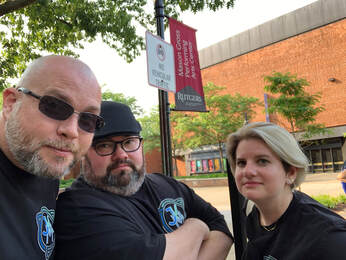 In an attempt to keep some of the momentum from last week's Rutgers Writers' Conference, and in a concerted effort to practice what I'm about to preach, I thought I should put out another post without waiting a full calendar year. Today I confront some of my own mental blocks to writing: Writer's Block, Guilt, and Ghosts. Fortunately, only one of these is real. Neil Gaiman once said, "I don't believe in writer's block, but I absolutely believe in getting stuck. The difference is one is imposed on you by the gods, and one is your own damn fault." Neil Gaiman Interview click here. I certainly recognize how foolish it would be to hold myself out as a writing authority on par with Neil Gaiman, but I feel so strongly about the myth we call Writer's Block that I have to add just a few words. First, let's all agree that Writer's Block is complete and utter bullshit. It's simply not a thing. It doesn't happen. As Gaiman ably points out, no other profession suffers from the dreaded block. There is no Teacher's Block or Parent's Block no matter how much we might wish it so ("Sorry, son, you'll have to do your own laundry today. I've got the Parent's Block."). I have, however, been "stuck" in my writing. I've experienced those moments in a story where I've taken a wrong step, and like the engine of car deprived of oil, the imagination seizes and will go no farther until the error is corrected. Your subconscious mind sees what your waking brain misses, and almost as a fail-safe, it stops you from compounding your mistakes. Once again, I'm not sure this experience is unique for writers. There have certainly been times in my teaching career when lessons have bombed. The only real difference in the experience is that you can't just throw on the brakes, stop the lesson mid-class, and sit down at your desk to figure out where your life went wrong. You push through the lesson the best you can, reflect on where it went off the rails, and try to do better the next time. You don't get to just stop teaching. And this is where I don't think Neil Gaiman goes far enough in his remarks. We need to call out Writer's Block and being Stuck for what they really are... excuses not to write. As writers, it's too easy to throw up our hands, blame the absent muse, and go about our days (or weeks or months) without touching a keyboard. Our writer's block becomes an excuse to ignore the discipline required for consistent writing. If we truly want to become better writers, we need to write and we need to write consistently. There is no sport, skill, or talent on earth that flourishes in disuse. Writing, just like golf or piano or laundry is refined in practice, and consistent practice is more effective than infrequent practice. So when a writer is stuck, it is important that we continue to carve out that time at our keyboards, clacking away. If a story won't move forward, try going back. Edit a previous chapter. Start something entirely new. Drop your lost character into a different setting and get to know them better. Try a writing prompt. Find a writing group - there is nothing like the deadline of a submission to your writers group to get the imagination-engine purring again. Whatever it takes, you have to write! You owe it to yourself and your talents not to ignore your craft. Getting stuck happens, but staying there is your choice. #WriteOn 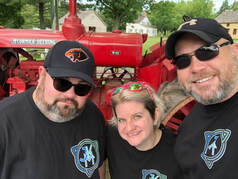 This past weekend I had the opportunity to attend the third annual Rutgers Writers' Conference. It was an amazing experience to spend time focused on the craft of writing, getting insights from talented writers who I truly admire, and best of all, spending the weekend with two of my favorite people - Mike Shaw and Kara Knauss from the Pitman Writers' Guild. So, in no particular order, here's Rutgers Writers' Con 2019:
All in all, it was a great weekend! |
Archives
June 2020
Categories |
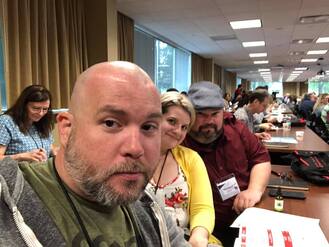
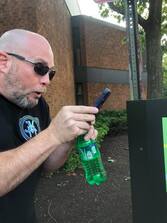
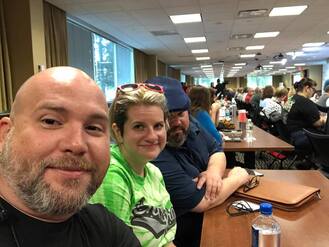

 RSS Feed
RSS Feed